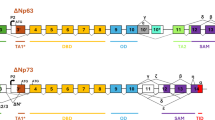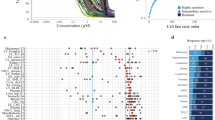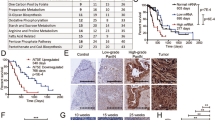Abstract
The p73 protein is a transcription factor and member of the p53 protein family that expresses as a complex variety of isoforms. ΔNp73α is an N-terminally truncated isoform of p73. We found that ΔNp73 protein is upregulated in human gastric carcinoma suggesting that ΔNp73 may play an oncogenic role in these tumors. Although it has been shown that ΔNp73α inhibits apoptosis and counteracts the effect of chemotherapeutic drugs, the underlying mechanism by which this p73 isoform contributes to chemotherapeutic drug response remains to be explored. We found that ΔNp73α upregulates MDR1 mRNA and p-glycoprotein (p-gp), which is involved in chemotherapeutic drug transport. This p-gp upregulation was accompanied by increased p-gp functional activity in gastric cancer cells. Our data suggest that upregulation of MDR1 by ΔNp73α is mediated by interaction with p53 at the MDR1 promoter.
This is a preview of subscription content, access via your institution
Access options
Subscribe to this journal
Receive 50 print issues and online access
$259.00 per year
only $5.18 per issue
Buy this article
- Purchase on SpringerLink
- Instant access to full article PDF
Prices may be subject to local taxes which are calculated during checkout





Similar content being viewed by others
References
Casciano I, Mazzocco K, Boni L, Pagnan G, Banelli B, Allemanni G et al. (2002). Expression of DeltaNp73 is a molecular marker for adverse outcome in neuroblastoma patients. Cell Death Differ 9: 246–251.
Chin KV, Ueda K, Pastan I, Gottesman MM . (1992). Modulation of activity of the promoter of the human MDR1 gene by Ras and p53. Science 255: 459–462.
Choi JH, Lim HY, Joo HJ, Kim HS, Yi JW, Kim B et al. (2002). Expression of multidrug resistance-associated protein1,P-glycoprotein, and thymidylate synthase in gastric cancer patients treated with 5-fluorouracil and doxorubicin-based adjuvant chemotherapy after curative resection. Br J Cancer 86: 1578–1585.
Concin N, Hofstetter G, Berger A, Gehmacher A, Reimer D, Watrowski R et al. (2005). Clinical relevance of dominant-negative p73 isoforms for responsiveness to chemotherapy and survival in ovarian cancer: evidence for a crucial p53-p73 cross-talk in vivo. Clin Cancer Res 11: 8372–8383.
Dittmer D, Pati S, Zambetti G, Chu S, Teresky AK, Moore M et al. (1993). Gain of function mutations in p53. Nat Genet 4: 42–46.
Dominguez G, Garcia JM, Pena C, Silva J, Garcia V, Martinez L et al. (2006). DeltaTAp73 upregulation correlates with poor prognosis in human tumors: putative in vivo network involving p73 isoforms, p53, and E2F-1. J Clin Oncol 24: 805–815.
Fillippovich I, Sorokina N, Gatei M, Haupt Y, Hobson K, Moallem E et al. (2001). Transactivation-deficient p73alpha (p73Deltaexon2) inhibits apoptosis and competes with p53. Oncogene 20: 514–522.
Guan M, Chen Y . (2005). Aberrant expression of DeltaNp73 in benign and malignant tumours of the prostate: correlation with Gleason score. J Clin Pathol 58: 1175–1179.
Hoppe-Seyler F, Butz K . (1993). Repression of endogenous p53 transactivation function in HeLa cervical carcinoma cells by human papillomavirus type 16 E6, human mdm-2, and mutant p53. J Virol 67: 3111–3117.
Hotta T, Tanimura H, Iwahashi M, Tani M, Tsunoda T, Noguchi K et al. (1999). P-glycoprotein-expressing tumor cells are resistant to anticancer drugs in human gastrointestinal cancer. Surg Today 29: 591–596.
Hu Z, Jin S, Scotto KW . (2000). Transcriptional activation of the MDR1 gene by UV irradiation. Role of NF-Y and Sp1. J Biol Chem 275: 2979–2985.
Johnson RA, Ince TA, Scotto KW . (2001). Transcriptional repression by p53 through direct binding to a novel DNA element. J Biol Chem 276: 27716–27720.
Johnson RA, Shepard EM, Scotto KW . (2005). Differential regulation of MDR1 transcription by the p53 family members. Role of the DNA binding domain. J Biol Chem 280: 13213–13219.
Kaghad M, Bonnet H, Yang A, Creancier L, Biscan JC, Valent A et al. (1997). Monoallelically expressed gene related to p53 at 1p36, a region frequently deleted in neuroblastoma and other human cancers. Cell 90: 809–819.
Lacueva FJ, Teruel A, Calpena R, Medrano J, Mayol MJ, Perez-Vazquez MT et al. (1998). Detection of P-glycoprotein in frozen and paraffin-embedded gastric adenocarcinoma tissues using a panel of monoclonal antibodies. Histopathology 32: 328–334.
Liu G, Nozell S, Xiao H, Chen X . (2004). DeltaNp73beta is active in transactivation and growth suppression. Mol Cell Biol 24: 487–501.
Nakagawa T, Takahashi M, Ozaki T, Watanabe Ki K, Todo S, Mizuguchi H et al. (2002). Autoinhibitory regulation of p73 by Delta Np73 to modulate cell survival and death through a p73-specific target element within the Delta Np73 promoter. Mol Cell Biol 22: 2575–2585.
Parkin DM, Bray F, Ferlay J, Pisani P . (2005). Global cancer statistics, 2002. CA Cancer J Clin 55: 74–108.
Petrenko O, Zaika A, Moll UM . (2003). deltaNp73 facilitates cell immortalization and cooperates with oncogenic Ras in cellular transformation in vivo. Mol Cell Biol 23: 5540–5555.
Pozniak CD, Radinovic S, Yang A, McKeon F, Kaplan DR, Miller FD . (2000). An anti-apoptotic role for the p53 family member, p73, during developmental neuron death. Science 289: 304–306.
Stiewe T, Putzer BM . (2002). Role of p73 in malignancy: tumor suppressor or oncogene? Cell Death Differ 9: 237–245.
Thottassery JV, Zambetti GP, Arimori K, Schuetz EG, Schuetz JD . (1997). p53-dependent regulation of MDR1 gene expression causes selective resistance to chemotherapeutic agents. Proc Natl Acad Sci USA 94: 11037–11042.
Tomkova K, Belkhiri A, El-Rifai W, Zaika AI . (2004). p73 isoforms can induce T-cell factor-dependent transcription in gastrointestinal cells. Cancer Res 64: 6390–6393.
Tomkova K, El-Rifai W, Vilgelm A, Kelly MC, Wang TC, Zaika AI . (2006). The gastrin gene promoter is regulated by p73 isoforms in tumor cells. Oncogene 25: 6032–6036.
Uramoto H, Sugio K, Oyama T, Nakata S, Ono K, Morita M et al. (2004). Expression of deltaNp73 predicts poor prognosis in lung cancer. Clin Cancer Res 10: 6905–6911.
Vollrath V, Chianale J, Gonzalez S, Duarte I, Andrade L, Ibanez L . (1991). Multidrug resistance gene and P-glycoprotein expression in gastric adenocarcinoma and precursor lesions. Virchows Arch B Cell Pathol Incl Mol Pathol 60: 133–138.
Vossio S, Palescandolo E, Pediconi N, Moretti F, Balsano C, Levrero M et al. (2002). DN-p73 is activated after DNA damage in a p53-dependent manner to regulate p53-induced cell cycle arrest. Oncogene 21: 3796–3803.
Vousden KH . (2006). Outcomes of p53 activation—spoilt for choice. J Cell Sci 119: 5015–5020.
Wallner J, Depisch D, Gsur A, Gotzl M, Haider K, Pirker R . (1993). MDR1 gene expression and its clinical relevance in primary gastric carcinomas. Cancer 71: 667–671.
Zaika AI, Slade N, Erster SH, Sansome C, Joseph TW, Pearl M et al. (2002). DeltaNp73, a dominant-negative inhibitor of wild-type p53 and TAp73, is up-regulated in human tumors. J Exp Med 196: 765–780.
Acknowledgements
We thank Drs Belkhiri and Revetta for their assistance.
Author information
Authors and Affiliations
Corresponding author
Additional information
Grant support: This work was supported by the National Cancer Institute: grants NIH CA108956, NIH CA129655 and NIH 5PO CA095103.
Rights and permissions
About this article
Cite this article
Vilgelm, A., Wei, J., Piazuelo, M. et al. ΔNp73α regulates MDR1 expression by inhibiting p53 function. Oncogene 27, 2170–2176 (2008). https://doi.org/10.1038/sj.onc.1210862
Received:
Revised:
Accepted:
Published:
Issue date:
DOI: https://doi.org/10.1038/sj.onc.1210862
Keywords
This article is cited by
-
Clinical implications of the deregulated TP73 isoforms expression in cancer
Clinical and Translational Oncology (2018)
-
Activation of NADPH oxidases leads to DNA damage in esophageal cells
Scientific Reports (2017)
-
ΔNp73 regulates the expression of the multidrug-resistance genes ABCB1 and ABCB5 in breast cancer and melanoma cells - a short report
Cellular Oncology (2017)
-
A balancing act: orchestrating amino-truncated and full-length p73 variants as decisive factors in cancer progression
Oncogene (2015)
-
Structurally diverse MDM2–p53 antagonists act as modulators of MDR-1 function in neuroblastoma
British Journal of Cancer (2014)



